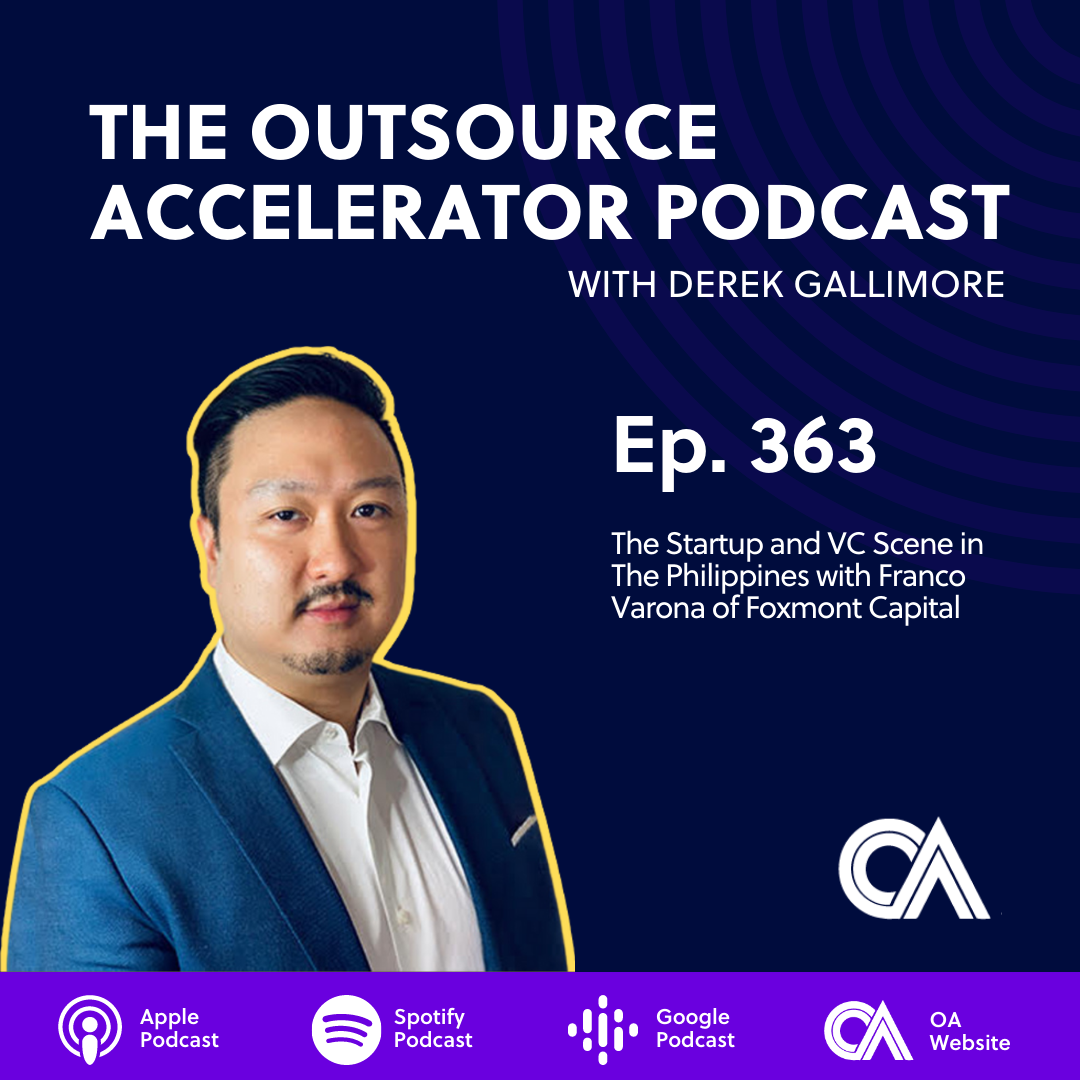The Startup and VC Scene in The Philippines with Franco Varona of Foxmont Capital

Foxmont Capital Partners
Derek Gallimore talks with Franco Varona, managing partner at Foxment Capital Partners. Based in the Philippines, the venture firm helps startups connect to the industries and solve challenges in building their company by providing access to funding.
Started venture capital funding in 2018, the Philippine market still has a lot to improve in terms of flourishing venture startups. In this episode, Derek and Franco will share insights into the startup and VC market in the country and how unicorns such as Kumu became successful in tapping the local market.
Franco Varona is a managing partner at Foxmont Capital Partners, an independent early-stage venture capital firm in the Philippines. Working with startups at the seed stage, Foxmont Capital “invests in founders with great ideas looking to solve Filipino problems.”

A look at the venture capital (VC) and startup market in Southeast Asia
Franco explained that the VC and startup market in Southeast Asia differs from the other parts of the world, especially in the West.
Coming from different backgrounds, Southeast Asian countries vary in terms of language, culture, and levels of development. For this, investors “can’t have a specific investment strategy” in the region.
Compared to the US and European venture firms focusing on “moonshot ideas,” venture capital in the region is either focused on new ideas or the country itself.
Franco believes that Filipino startups can create new ideas like in other countries. However, according to him, the most pressing and urgent issues in the Philippines should focus on looking for “Filipino solutions for Filipino problems.”
What the Philippines learned from the Indonesian market
Franco observed that Filipino startups in 2018 struggled to find funding from venture firms in Singapore, which puzzled him at first. Indonesia, meanwhile, already has five unicorn startups and a thriving ecosystem.
He soon realized the country’s best practice. They started cultivating local VF companies a decade earlier than the Philippines.
East Ventures, one of the leading VC firms in the country, had its first investment in Tokopedia in 2011. The boom that followed this made investors realize that they “don’t have to look outside [Indonesia] for deals.”
Rather, they only need great founders that are resilient, strong, and smart enough to face the challenges in the Indonesian market.
The Philippines only realized this as early as 2018, with Foxmonth’s first released check. Though, same as in Indonesia, the Philippine startup market quickly picked up its pace in three years, up to recently.
The pandemic as a big player for accelerating changes in the country
Franco admits that the COVID pandemic had negative effects on the Philippines and the world. Though, it also “accelerated the rapid digitalization” in the country. Indeed, much has changed within 18 months, from using straight analog to “extremely digital” transformation.
This change has been evident when it comes to the technology used by Filipinos. Per Franco, mobile connections on a per capita basis in the country are higher than in Indonesia.
Unlike in other countries, Filipinos went “from smartphones to better smartphones to two smartphones.”
Social media as another player for growth
Another player for this change could point to the popularity of platforms such as YouTube, TikTok, and Facebook. These platforms pretty much paved the way for having global influence in the Philippines.
Per Franco, investors usually look at portability. They look at deals, startups, and their high potential in the home market. He thinks that everyone should absorb the idea that a startup can succeed anywhere if it succeeds in the Philippines.
Some Filipino startups usually “go to a foreign market” after building their businesses and gaining little traction in the local market. With this, Franco advises startups to “focus in on the Philippines” and “win their domestic market” first.
Kumu and the startup side of the Philippines
Kumu is one of the Philippines’ unicorns with a value of Php 5 billion upon completing Series C funding. Per Franco, the company is one of the country’s “first grassroots startup champions.”
A live-streaming app for Filipinos, the platform is widely used by Filipino streamers to reach their audiences within the country. The app soon spread to both local citizens and overseas Filipino workers (OFWs).
Franco emphasized that Kumu “created authentic connections,” especially during the pandemic.
According to him, the first generation of founders in the Philippines helped pave the way to build the brands today. This includes Lazada, Zalora, and Lamudi. Foxmont currently invests in this generation because “they already know how to win the market.”
Meanwhile, Franco believes that the second generation of founders will be the ones who “graduated from the likes of Kumu” and other fastest-growing startups.
Being educated domestically, this generation “won’t be drawn from foreign entities” and would rather grow their businesses locally.

Foxmont on helping startups grow through VC funding
Founded in 2018, Foxmont is “funded by entrepreneurs for entrepreneurs.” They understand the challenges faced by entrepreneurs in the Philippine setting, including the challenges of building a startup.
Per Franco, the company does not just invest “dumb money.” Foxmont helps their clients with the help of their own experiences and connect with other startups.
Franco believes that Foxmont has three main roles:
- To drive value to their LPs/investors
- Drive value to startups and portfolio funders
- See fund relations as an integral part of business activity
According to him, investors are easy to discount the Philippines as “just not ready yet” for foreign investments.
What Franco needs is “three minutes of [investor’s] time and focus” for them to understand the potential of the Philippine market.
Entrepreneurs interested in reaching out to Foxmont may reach them through their LinkedIn account or https://www.foxmontcapital.com/.







 Independent
Independent




